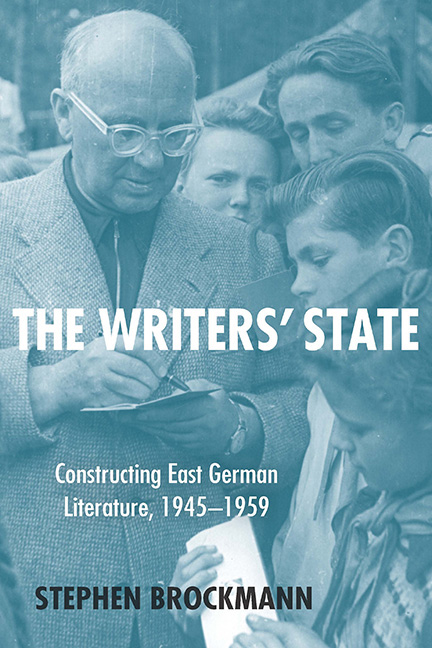Introduction: Reconstructing East German Literature
Published online by Cambridge University Press: 05 February 2016
Summary
THIS BOOK EXPLORES THE EMERGENCE of East German literature from 1945–59. The focus on the 1940s and 1950s is relatively unusual, since most studies of East German literature, particularly in the English-speaking world, have addressed primarily later periods, from 1961 onward. That emphasis is understandable, since scholarship on East German literature outside of Germany did not really begin until the 1970s. It was only logical for the scholars who initiated that exploration to focus primarily on more contemporary works—especially since those works also seemed to meet Western standards of literary merit better than some of the more obviously socialist, politicized literature of the 1940s and 1950s.
When scholarship on East German literature began, therefore, many scholars, even in Germany itself, tended to emphasize literary discontinuities between the first decades of GDR literature and later decades. The emphasis on such discontinuities was, as Julia Hell has pointed out, one of the “critical orthodoxies” concerning East German literature in the 1970s and 1980s, and it continues to influence literary criticism to this day. The unconventional, innovative work of authors such as Christa Wolf, Heiner Müller, Irmtraud Morgner, and Volker Braun in the 1960s, 1970s, and 1980s was seen above all as a critical response to, and break with, the more obviously partisan—and frequently socialist—literature of the 1950s. It was easier to make a claim for the aesthetic value of—to take one prominent example—Wolf's novel Kindheitsmuster (Patterns of Childhood, 1976), which deals in a complex way with a young woman's coming-of-age in the Nazi period, than for Eduard Claudius's socialist realist novel Menschen an unserer Seite (People on Our Side, 1951), a book that addresses the work lives of laborers in a Berlin factory. Wolf's novel satisfied Western literary and aesthetic criteria for modernist literature more easily. Similar comparative statements could be made for other pairs of authors as well.
There is much to be said for the narrative of discontinuity between the literature of the 1940s and 1950s and subsequent literature. Writers such as Wolf, Müller, Morgner, and Braun were indeed in many ways responding to the work their predecessors had created, and they also intentionally produced literature that differed from it. There are, however, two fundamental problems with a focus on discontinuity.
- Type
- Chapter
- Information
- The Writers' StateConstructing East German Literature, 1945-1959, pp. 1 - 24Publisher: Boydell & BrewerPrint publication year: 2015



